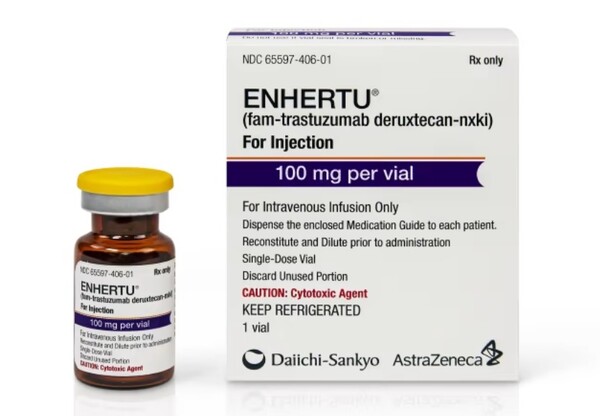The developers of the innovative new drug Enhertu (trastuzumab deruxtecan) have recently ended price negotiations with the National Health Insurance Service (NHIS) to receive reimbursement as early as next month.
On Monday, the NHIS announced the settlement of Enhertu’s price bargaining by updating its Drug Price Negotiation Completion List.

If approved by the Health Insurance Policy Review Committee of the Ministry of Health and Welfare at the end of this month, Korean cancer patients can get a prescription for Enhertu with insurance benefits in April, sources said.
This means that Enhertu will be on the reimbursement list a year and a half after they won domestic approval in September 2022.
AstraZeneca and Daiichi Sankyo's Enhertu will be reimbursed for the "second-line treatment of patients with unresectable or metastatic HER2-positive breast cancer" and "third-line treatment of patients with locally progressive or metastatic HER2-positive adenocarcinoma of the stomach or gastroesophageal junction.
Enhertu drew attention upon its debut, demonstrating a median progression-free survival (mPFS) about four times longer (28.8 months vs. 6.8 months, HR=0.33) and a significant improvement in overall survival compared to Kadcyla (trastuzumab emtansine), the first-generation antibody-drug conjugate (ADC), in the second-line treatment of patients with HER2-positive breast cancer.
In addition, for the third-line or later treatment of patients with HER2-positive gastric or gastroesophageal junction adenocarcinoma, Enhertu demonstrated improvements in OS and PFS compared to conventional salvage chemotherapy (irinotecan or paclitaxel). Thus, it is the drug of last resort in treating HER2-positive gastric cancer, which has long been considered a barren area for new remedies.
Besides, Enhertu was the first to establish a new standard of care for breast cancer called "HER2 low expression.” At the American Society of Clinical Oncology Annual Meeting (ASCO 2022) in June 2022, the Phase 3 DESTINY-Breast04 study was selected as a plenary session to present the results of the study in patients with HER2 low-expressing breast cancer. The study showed that Enhertu reduced the risk of disease progression or death by 50 percent compared to conventional chemotherapy in patients with low HER2 expression, which is more than half of patients with metastatic breast cancer.
However, Enhertu was not yet available in Korea at the time.
As the treatment's results were announced overseas, Korean patients took action. They started posting a petition urging the government to approve the drug quickly, and the Ministry of Food and Drug Safety (MFDS) approved it.
However, even after the MFDS' approval, Enhertu has long remained “a pie in the sky” for Korean patients. The drug was not included in the ICER (incremental cost effectiveness ratio) threshold of less than 5,000, which the government uses to evaluate the cost-effectiveness of anticancer drugs.
As a result, the reimbursement review was delayed, and Korean patients had to pay tens of millions of won per treatment. After a series of public petitions complaining of the financial burden, the issue became an issue at the National Assembly’s administrative audit.
Finally, late last year, the government announced that it would flexibly apply the ICER threshold for innovative new drugs, and Enhertu became the first case.
Meanwhile, Enhertu is under review by the MFDS for an expanded indication for patients with HER2 low-expressing breast cancer. The Korean regulator is reviewing the "HER2 low expression" indication, which was approved by the U.S. Food and Drug Administration (FDA) as early as in August 2022, two months after receiving a standing ovation for its DESTINY-Breast04 study at ASCO 2022.
However, even if the indication for HER2 low-expressing breast cancer is expanded in Korea within the year, it is unlikely that the reimbursement threshold for Enhertu will be expanded because it has just entered into the reimbursement range.
Korean patients have a long way to go before receiving the benefits their foreign counterparts enjoy, observers said.
Related articles
- ‘Recognizing Enhertu’s innovative drug price will help Korean patients and industry’
- All eyes of patients and drugmakers are on reimbursement of Enhertu
- Breast cancer patients keep appealing for quick reimbursement of Enhertu
- Enhertu moves closer to insurance coverage by passing drug-reimbursing panel
- Enhertu to get insurance coverage for metastatic breast/stomach cancer from April
- Breast cancer drug Enhertu's breakthrough results unveiled at GBCC 2024

